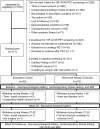Effect of aerobic exercise on amyloid accumulation in preclinical Alzheimer's: A 1-year randomized controlled trial
- PMID: 33444359
- PMCID: PMC7808620
- DOI: 10.1371/journal.pone.0244893
Effect of aerobic exercise on amyloid accumulation in preclinical Alzheimer's: A 1-year randomized controlled trial
Abstract
Background: Our goal was to investigate the role of physical exercise to protect brain health as we age, including the potential to mitigate Alzheimer's-related pathology. We assessed the effect of 52 weeks of a supervised aerobic exercise program on amyloid accumulation, cognitive performance, and brain volume in cognitively normal older adults with elevated and sub-threshold levels of cerebral amyloid as measured by amyloid PET imaging.
Methods and findings: This 52-week randomized controlled trial compared the effects of 150 minutes per week of aerobic exercise vs. education control intervention. A total of 117 underactive older adults (mean age 72.9 [7.7]) without evidence of cognitive impairment, with elevated (n = 79) or subthreshold (n = 38) levels of cerebral amyloid were randomized, and 110 participants completed the study. Exercise was conducted with supervision and monitoring by trained exercise specialists. We conducted 18F-AV45 PET imaging of cerebral amyloid and anatomical MRI for whole brain and hippocampal volume at baseline and Week 52 follow-up to index brain health. Neuropsychological tests were conducted at baseline, Week 26, and Week 52 to assess executive function, verbal memory, and visuospatial cognitive domains. Cardiorespiratory fitness testing was performed at baseline and Week 52 to assess response to exercise. The aerobic exercise group significantly improved cardiorespiratory fitness (11% vs. 1% in the control group) but there were no differences in change measures of amyloid, brain volume, or cognitive performance compared to control.
Conclusions: Aerobic exercise was not associated with reduced amyloid accumulation in cognitively normal older adults with cerebral amyloid. In spite of strong systemic cardiorespiratory effects of the intervention, the observed lack of cognitive or brain structure benefits suggests brain benefits of exercise reported in other studies are likely to be related to non-amyloid effects.
Trial registration: NCT02000583; ClinicalTrials.gov.
Conflict of interest statement
This work was supported by the National Institutes of Health R01 AG043962 (JMB); K99 AG050490 (JKM) and gifts from Frank and Evangeline Thompson (JMB), The Ann and Gary Dickinson Family Charitable Foundation, John and Marny Sherman, and Brad and Libby Bergman. Institutional infrastructure support for testing was provided in part by UL1 TR000001 (RJB) and P30 AG035982 (RHS JMB). Lilly Pharmaceuticals provided a grant to support F18-AV45 doses and partial scan costs (JMB). The content is solely the responsibility of the authors and does not necessarily represent the official views of the National Institutes of Health. The funders had no role in study design, data collection and analysis, decision to publish, or preparation of the manuscript. This does not alter our adherence to PLOS ONE policies on sharing data and materials.
References
Publication types
MeSH terms
Substances
Associated data
Grants and funding
LinkOut - more resources
Full Text Sources
Other Literature Sources
Medical


